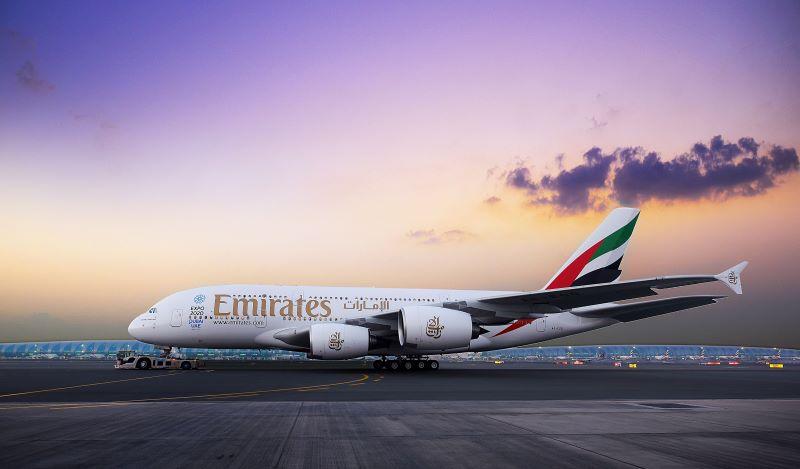
Emirates Airbus A380
ISTANBUL—Emirates has begun work on another large order for widebody aircraft as the airline prepares for the replacement of a bigger part of its current fleet.
“We are looking at buying a number of extra aircraft,” Emirates Airline President Tim Clark said on the sidelines of the International Air Transport Association (IATA) annual general meeting in Istanbul June 6. Clark did not specify what the number is the airline is looking at or when it will make a decision. But he hinted that the carrier is in the process of retrofitting 140 aircraft (Boeing 777-300ERs and Airbus A380s) with new cabins to extend their service lives with Emirates and compensating for delivery delays that have severely impacted the carrier’s capacity planning. “They have a finite life,” Clark said.
The airline’s current fleet consists of 116 A380s and 157 777-300ERs, all of which must be replaced eventually, plus Emirates needs a lot more growth capacity for the medium and long term. The company has firm orders in place for 115 Boeing 777Xs, among them 80 777-9s and 35 777-8s. Emirates also ordered 30 787-9s and 50 A350s in 2019. However, the 787 order is currently “under discussion” according to Clark. He has indicated in the past that Emirates may end up not taking them.
The A350s will be the first new aircraft, to be delivered in July or August of 2024. Clark is also hopeful that Boeing will begin delivering 777-9s in the second half of 2025, more than five years later than originally planned.
Clark said he was “irritated” when Boeing postponed the 777-8 by several years, redesigned it and prioritized the freighter version, the 777-8F. The first Emirates aircraft would have been due for delivery in 2024, but now it will only come after the -8F. “It would have been nice if Boeing had asked us first,” Clark said. On the other hand, he has looked at the specifications of the redesigned 777-8 and thinks it could be “a very good aircraft.”
“It is imperative to us that Boeing get their act together and deliver the [777-9],” Clark said. “And the [U.S. Federal Aviation Administration] needs to arm itself with more human resources.”
Emirates operates 90-95 of the 116 A380s it has retained. The aircraft will begin to be retired by 2032, but the airline will continue to operate A380s through the 2030s, Clark said.
As for the new aircraft, Emirates is looking at ordering more 777-9s, A350s and potentially 787s, should the review of the existing order confirm that the airline will stick to the type. But even the A350, which will be the smallest type the airline operates in the future, will change the network substantially as it will allow Emirates to go into smaller markets for which the 777-300ER is too big. In particular, more points in Africa and Asia are considered.
Ahead of taking any new aircraft, Airbus has begun retrofitting the current fleet of A380s and 777s with new cabins as it plans to operate them longer than originally planned.
All the plans are being made against the backdrop of extremely strong demand. “For the next nine months we are full,” Clark said. “If the [Russia-Ukraine] war ends, I can see another kickstart to the global economy.” In his experience, demand “reshapes itself and grows” after every crisis.
In addition to increasing frequencies on existing markets, Emirates wants to add new destinations in Asia, Africa, Latin America and North America. Clark is encouraged by the first results coming out of codesharing with United and Air Canada, which “gives us enormous scope.”
By contrast, the limitations of the bilateral air services agreement between India and the United Arab Emirates continue to keep Emirates from adding more seats to what is expected to become the biggest growth market in aviation. Emirates and FlyDubai combined can offer 65,000 weekly seats in each direction per week, at the same time “demand is off the clock,” as Clark put it. Approaches to the Indian government about more capacity have been rejected. But he has hopes that once Air India is growing its international flying based on recent orders, the attitude will change. “If Air India wants to expand, [the government of India] cannot curtail the rights of airlines in markets it wants to grow into,” Clark said.
China is another issue: Emirates is limited to 35 weekly flights but would like to do much more as soon as possible.





